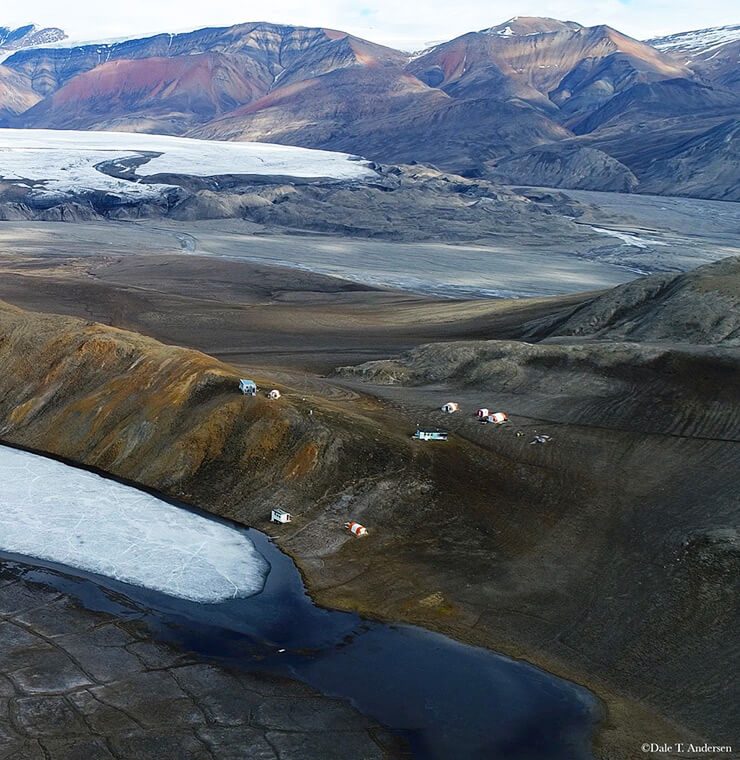Ressources and infrastructures
McGill Arctic Research Station (Axel Heiberg Island, Nunavut)
During field campaigns in the summers of 2021 and 2022, the T-MARS team will be hosted at the McGill Arctic Research Station (MARS - not to be confused with the title of our research project T-MARS, Terrestrial Mineral Analysis by Remote Sensing). This station is located inside Expedition Fiord on Axel Heiberg Island in Nunavut. Founded in 1960, MARS is one of the oldest seasonal field research facilities in the Arctic. The main research activities include glaciology, climate change, permafrost hydrology, geology, geomorphology, limnology, analogue planets, microbiology and astrobiology [1,2].
The MARS station can accommodate up to twelve people. The main building serves as a sleeping unit and laboratory, and another small building serves as a kitchen. These are positioned on the edge of a small lake, which is the source of water. The station is the base camp and fuel supply for the activities of the Polar Continental Shelf Program (PCSP), the program from Natural Resources Canada that provides logistical support throughout the Canadian Arctic to facilitate field research (their web page here, the brochure here). Thus, the logistics for our team's stay at the MARS research station will be planned in collaboration with PCSP.

Figure 1 : McGill Arctic Research Station. (INQ - Dale T. Anderson)
Photogrammetry and geomatics laboratory (Université de Sherbrooke)
This laboratory will be established at the Department of Applied Geomatics at the Université de Sherbrooke as part of the Canada Research Chair in Northern and Planetary Geological Remote Sensing of Prof. Myriam Lemelin, the Principal Investigator of the T-MARS project. It will contain five high-end image processing workstations including the following software: ENVITM and IDL, eCognition, ArcMap and PCI geomatics.
Spectroscopy laboratory (Université de Sherbrooke)
This laboratory will also be established at the Department of Applied Geomatics at the Université de Sherbrooke as part of Prof. Lemelin’s Research Chair. It will contain instruments such as a portable spectroradiometer ASD FieldSpec 4 Hi-Res NG portable and a Zeiss Axioscope 5 Polarization upright optical microscope.
Geochemical Laboratories and Facility for Electron Microscopy Research (McGill University)
The McGill University Geochemistry Laboratory is well equipped for the geochemical and mineralogical characterization of geological samples. Instruments include a JEOL 8900 electron microprobe, a Thermo ScientificTM iCAP Qinductively-couple plasma mass spectrometer, a Raman spectroscopy instrument, and an Applied Spectra Tandem LIBS instrument.
The Facility for Electron Microscopy Research is Canada’s leading electron microscopy facility. In addition to environmental and field-emission gun scanning electron microscopes, the facility also includes two high-resolution cryo-transmission electron microscopes, capable of imaging and analyzing elemental compositions in hydrated samples at sub-micrometer resolutions.
References
McGill University (2019) MARS: McGill Arctic Research Station, online (accessed 10-07-2019).
Andersen, D. (2019) McGill Arctic Research Station, online (accessed 10-07-2019).